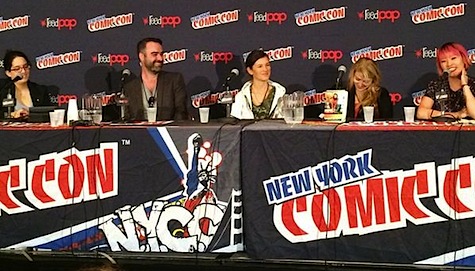In their first of three New York Comic-Con panels, The Mary Sue exhorted their audience to resist the old adage of “write what you know.” Editor-at-Large Susana Polo quoted Nikki Giovanni when explaining the impetus for their panel, Fight What You Know:
Writers don’t write from experience, although many are hesitant to admit that they don’t… If you wrote from experience, you’d get maybe one book, maybe three poems. Writers write from empathy.
Admitting that writing something that’s not your experience is scary, is a great place to start. Asking for tips? Even better. The panelists—including one of the co-writers of the new Batgirl and a Buffy alum—laid out the steps that every writer should go through to make sure your work is diverse and empathetic.
Polo moderated a panel including:
- Brendan Fletcher (Gotham Academy, Batgirl)
- Danica Novgorodoff (The Undertaking of Lily Chen)
- Amber Benson (The Witches of Echo Park)
- Wendy Xu (Angry Girl Comics)
Where do I start?
Before you even begin untangling the issues of creating relatable, well-represented characters, you have to get the setting right. While Fletcher talked about building a new borough into Gotham City (Burnside, for Batgirl #35), his words applied to all writing: “We have to have as much empathy for the place, strangely, and imagine that as much as we imagine these people.”
If you’re basing your work off a specific place, there’s nothing like visiting. Novgorodoff related how she was adapting a graphic novel from a screenplay set in rural Oregon: “I wanted to go there and see what the trees looked like, and what kind of houses were there, and what did the air smell like.” It was by poking around the town “and looking in people’s backyards” that she was able to get a real sense for where her story was based.
Of course, if you’re on a budget, there’s always Google Maps! Seriously—Amber Benson is a fan.
What do I do if I’m an introvert?
It can be intimidating not only to admit to your lack of knowledge, but to then have to track down people who can fill in the gaps for you. “I find that a lot of people I want to ask questions of are also introverts,” Novgorodoff said. She prefers writing letters to calling people up.
Similarly, Xu took to Tumblr, in researching her new project which includes a character who is Chinese, American, and Nigerian. The most valuable responses came from children from mixed-race families, telling funny stories about their parents: “I wasn’t so much interested in them making a sweeping statement about their cultural experience, but more about them telling a story.”
Is there such a thing as too much research? (Spoiler: No.)
All the writers agreed that whatever scraps you pick up in your research—even if they derail a story or if you never use them—can be recycled for future projects. Novgorodoff has a box she calls “the Orphanage,” into which she puts random ideas for futures.
“Friends can be great repositories!” Xu added, then launched into a side story about her friend’s thesis about mummy unwrapping parties and Victorian mummy porn. (Someone later asked during the Q&A when this thesis would appear online.) The lesson: Your peers’ projects may yield details or inspiration for your own work.
How do I feel comfortable and confident in my work, while still accepting criticism?
Always have a support system in place to double-check your work, whether it’s your publisher (as is the case with Fletcher’s work for big publishers like DC Comics, which has to follow stricter deadlines) or social media. “If 50 people are saying it’s an issue,” Xu said, “if it’s a recurring theme, then it’s worth taking into account.”
At the same time, don’t be too hard on yourself. “We’re not perfect,” Benson said. “We’re human beings, we make mistake… In the end, if you’re pleasing yourself and writing something that moves you, you’ll find other people who like it. You will get better. It’s the outlier principle—the more you do something, the better you’ll get at it.”
How do I balance representation while having characters still stand on their own?
“It’s important to be invested in what you’re writing,” Xu said. “You shouldn’t do representation for the sake of representation, because otherwise it feels tokening” and the reader can tell.
How do I make awful people who aren’t awful?
It’s all about nuance, Novgorodoff said: “For me, the real magic is writing characters who might do terrible things but aren’t terrible people, or who are terrible people who do good things.”
How do I draw the line between my setting being inspired by real life and not being constrained by real-world elements?
“I think there have to be real components to any fantasy world,” Benson said—smells, tall (or claustrophobic) buildings, the flow of people in and out. “You have to start with a kernel of reality.”
Photo: Twitter/@SamMaggs
Natalie Zutter writes plays about superheroes and sex robots, articles about celebrity conspiracy theories, and Tumblr rants about fandom. You can find her commenting on pop culture and giggling over Internet memes on Twitter.










